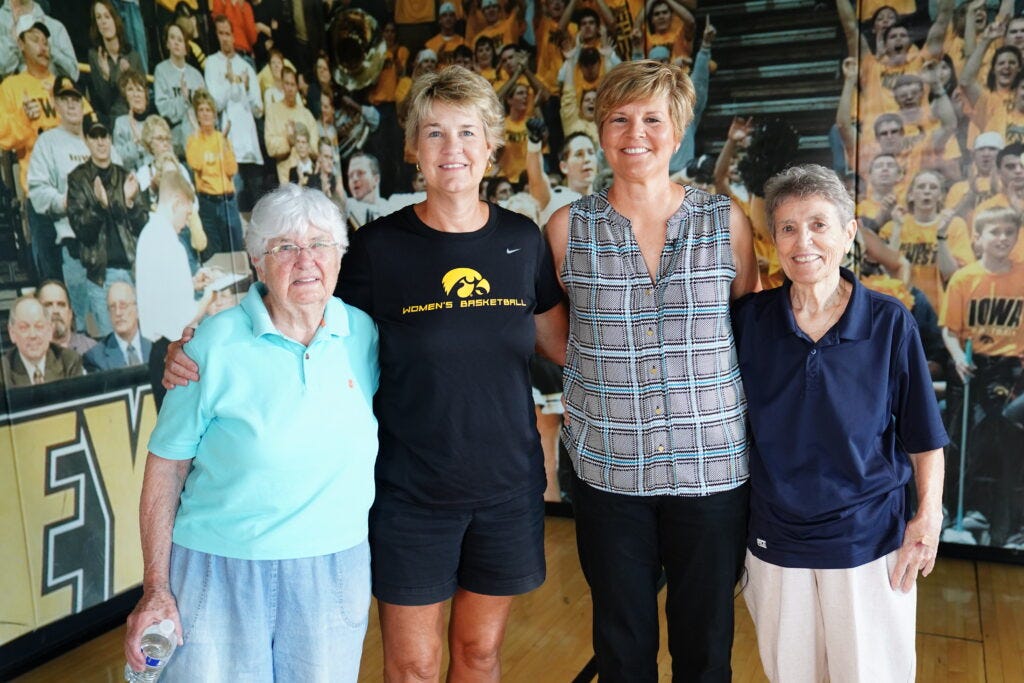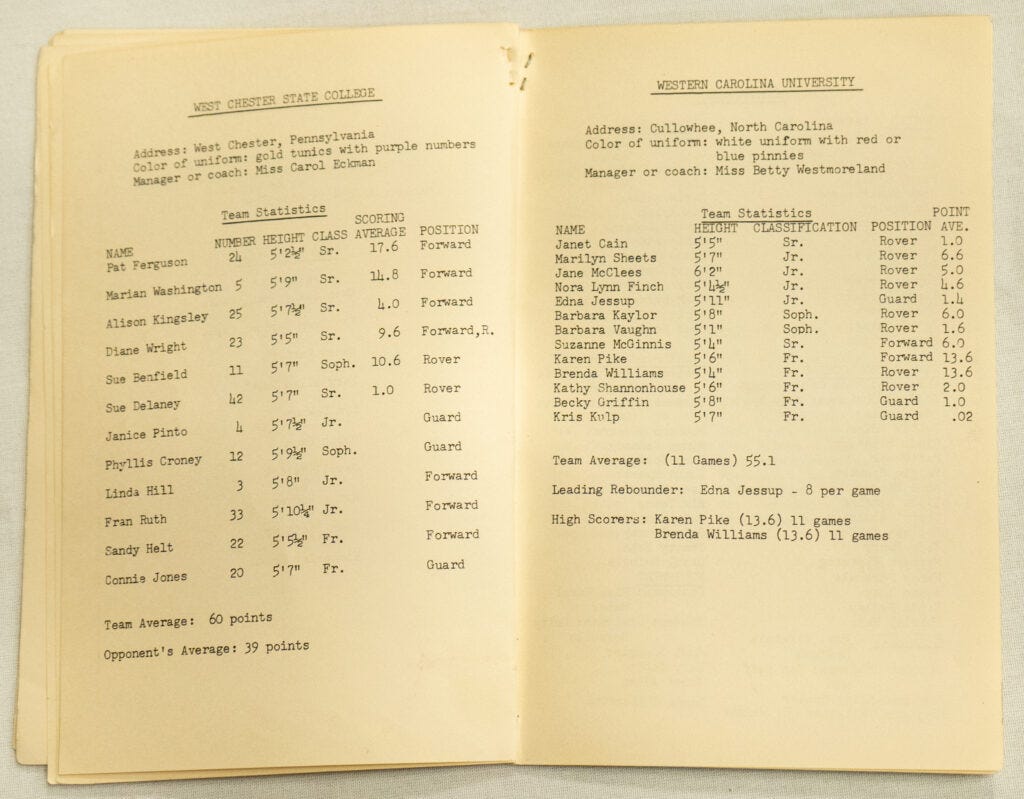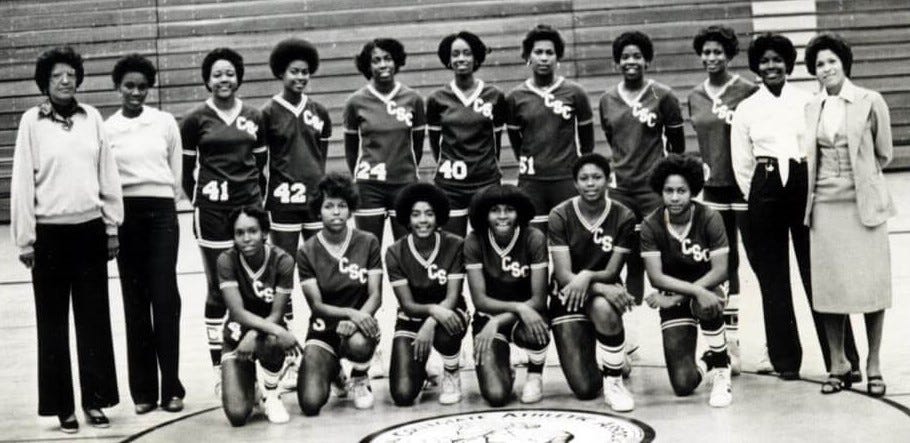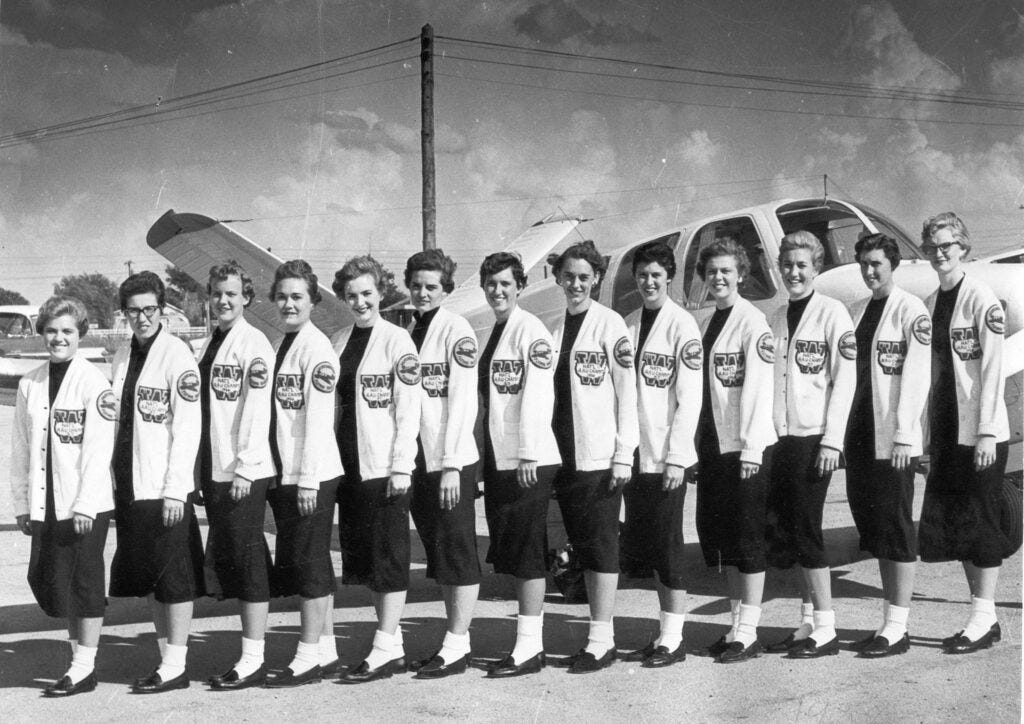Documentary series aims to give credit where credit is due
Forthcoming 10-part “If Not For Them” creates a true timeline for women’s basketball that goes back decades before Title IX

As Caitlin Clark has continued to set records in a historic season, a question has swirled around the Iowa megastar’s run:
Just whose records are being broken?
With her 33 points against Minnesota on Wednesday night, Clark surpassed by a point the mark of 3,649 career points that Lynette Woodard scored for Kansas in 1977-81. But because Woodard played in the Association of Athletics for Women (AIAW), the NCAA doesn’t recognize her accomplishments.
“With the attention Caitlin is bringing to the sport, this is the time to say, ‘Why wouldn’t we count Lynette’s record?’” said Brenda VanLengen, a women’s college basketball analyst for ESPN, Fox Sports and other networks. “It was just a different governing structure. It’s still the University of Kansas, it’s still large-college competition. Her record has stood for more than 40 years and has largely been ignored.”
Even Iowa Coach Lisa Bluder, whose 1979-83 career at Northern Iowa bridged the AIAW and NCAA eras, called Woodard’s mark the “real record” after Clark surpassed it.
So if you think Lynette Woodard is a piece of forgotten women’s basketball history, wait til you hear about Ora Washington, Cookie Barron or the first University of Iowa team to play in a national tournament (and they weren’t coached by C. Vivian Stringer).
VanLengen is making sure people hear about them and so many others with the documentary series “If Not For Them.” She is producing the 10-part series that creates a true timeline for the women’s basketball with a target to broadcast next year on a platform that has yet to be determined.
An accepted general wisdom for women’s sports is that it all began in 1972 with Title IX. And, as shown by how it treats Woodard’s record, the NCAA thinks it all started in 1982 when they began sponsoring women’s sports.
Iowans already know that isn’t the whole story, since high school girls have been playing basketball here for more than a century. Schools in other rural areas such as Texas or Oklahoma played, too, but that still wasn’t the whole story.
Shortly after James Naismith invented (no one is ever sure what the right word is) basketball in 1891, it became popular with women, too. Somewhere along the line, though, the powers that be thought women being tough and competitive was not acceptable, and dear heavens all that roughhousing might hurt their lady parts. So by the 1920s and 1930s, competitive sports for girls and women were replaced with school play days. Iowa called bull on that line of thinking, but most states did not.
“One of the reasons I got interested in this project was my grandma in Nebraska played basketball in high school, at least for a year, in the 1920s,” said VanLengen, who played at Nebraska-Kearney and was an assistant coach at Nebraska. “But my mom and my aunts, who went to school in the ’50s and ’60s, didn’t and I never understood why.”
Besides the why, VanLengen’s series looks at who.
There were the Flying Queens, so named because they were so popular that a local businessman bought them their own plane to travel to their games. Technically, they were the team from Wayland Baptist in Plainview, Texas. They played AAU basketball, which was then the competitive wing of women’s hoops in the decades leading up to Title IX. The Queens, whose Hall of Famer Cookie Barron never lost in her 1955-57 career, still are competitive women; in the documentary they revel in their smack talk from days gone by and still tear up while remembering the end of their 131-game winning streak in 1958.
“AAU provided opportunity that lit the flame in this country that women can compete,” VanLengen said. “That laid the foundation for colleges to play in championship tournaments.”
But the AAU mostly provided opportunity for white women. VanLengen’s series goes beyond that to be more inclusive.
“What often gets overlooked in our history is that there were a lot of communities of color supporting girls’ and women’s basketball,” she said. “We’re making sure we illuminate those stories as well.”
VanLengen gives some flowers to Ora Washington, a Black woman who starred for a team that was sponsored by the Philadelphia Tribune in the 1930s and 1940s.
“They played so well and were such a source of joy for the Black community,” VanLengen said. “They didn’t have any competition so they ended up touring to some Southern states and playing against other Black teams. A lot of people don’t know that story.”
And while Iowa’s long history in girls’ high school sports is well-documented, VanLengen highlights a more under-the-radar bit of Iowa women’s sports history. For starters, there was Iowa Wesleyan and its AAU play as well as being the second school to offer women’s basketball scholarships (after Wayland Baptist). But there was also what is considered the first collegiate women’s basketball tournament, sponsored by the Commission on Intercollegiate Athletics for Women (CIAW) and hosted by eventual champion West Chester (Pa.) State College in 1969.

Iowa Wesleyan came in third in that tournament, and Iowa finished fourth. “If Not For Them” features some of the women who were part of that, as well as those who continued to work side by side with Iowa Women’s Athletic Director Christine Grant in the AIAW and women’s sports at the university in the years that followed.
The coach of that 1969 Iowa team was Mildred (Millie) Barnes, who later coached at Central Missouri State and chaired the U.S. Women’s Olympic Basketball Committee in 1974-76. She was inducted into the Women’s Basketball Hall of Fame in 2000.
The Iowa women weren’t a varsity team and were invited to the 1969 tournament. They didn’t have warmups, so they borrowed them from the men’s team. The warmups were way too big and hung off the women like drapes. They were also without one of their best players because her boyfriend didn’t want her to make the trip.
“He convinced her that she should not go, so she didn’t go,” Barnes says in the documentary. “Her boyfriend didn’t like her playing basketball.”
VanLengen and her team have crisscrossed the country to get interviews, making those a priority as they fundraised for the project.
“It’s a race against time,” she said. “I’ve interviewed 115 people, most of them in their 70s or 80s and some even in their 90s. And four people have already passed away. It was so important to collect and preserve those memories.”

It’s easy to make the connections between “back then” and later eras. Former Iowa Coach Stringer first built Cheyney State into an HBCU and AIAW power that was national runner-up in the first NCAA tournament in 1982. In the early 1970s, the Wayland Baptist coach told Marsha Sharp she wasn’t good enough to make the team as a player and suggested she coach instead; in 1993, Sharp coached Texas Tech and superstar Sheryl Swoopes to the NCAA championship and has a stretch of freeway named after her in Lubbock. Marian Washington played on that 1969 West Chester title team and later became Woodard’s coach at Kansas.
VanLengen is working to complete the series before she formally pitches it to networks or streaming services. She didn’t want to do that prior to production because she wanted to maintain creative control and ownership of the content. The project has been set up as a nonprofit and VanLengen has no plans to make any money off it, truly making the effort a labor of love. Its eventual home, she said, will be the Women’s Basketball Hall of Fame in Knoxville, Tenn.
“I’d really like to get it out there to colleges and universities for their women’s studies, leadership, sports history,” she said. “I want this to be available for sound bites and other lessons we can share from these remarkable women.”
“If Not For Them” is a nonprofit project that accepts donations in all amounts. Those who make a contribution will receive a private link to the hour-long sneak preview of the series that was first shown at last season's Women's Final Four.
Jane Burns is a former sports and features writer for the Des Moines Register, as well as other publications and websites. Over the course of her career she’s covered pretty much everything, which is why her as-yet-to-be-written memoir will be called “Cheese and Basketball: Stories From a Reporter Who Has Covered Everything.”
Iowa Writers’ Collaborative
I’m happy to join fellow Iowa writers and journalists as part of the Iowa Writers’ Collaborative. To receive a roundup of the week’s columns, subscribe to the Collaborative’s Sunday email.





Jane Burns you have made me cry this morning. I am overjoyed that "If Not For Them" will soon come to us so we can witness the history of women's basketball. In the 1960s when I was in high school we were only allowed to play intramural bb in the mornings before school. It would have been so much fun to have had a school sanctioned team. Thank you.
Thank you!
I always thought it was weird that when Iowa high school girls played 6 on 6 basketball only the small towns had teams. I grew up in Mason City and we had no girls basketball except intramurals until the mid 70’s. Why not us??